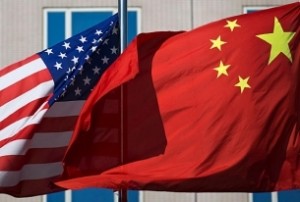 A central focus of this blog is handicapping the global power sweepstakes between the United States and China. And a regular theme here is the role private enterprise is playing in revitalizing U.S. strategic power – whether it’s in the resurgence of the manufacturing sector or in launching the oil and natural gas boom (here and here) that is rapidly transforming the global energy scene. Compare this to the situation in China, where lumbering state-owned corporations threaten to scuttle much-needed economic reforms and are unable to duplicate America’s shale energy revolution.
A central focus of this blog is handicapping the global power sweepstakes between the United States and China. And a regular theme here is the role private enterprise is playing in revitalizing U.S. strategic power – whether it’s in the resurgence of the manufacturing sector or in launching the oil and natural gas boom (here and here) that is rapidly transforming the global energy scene. Compare this to the situation in China, where lumbering state-owned corporations threaten to scuttle much-needed economic reforms and are unable to duplicate America’s shale energy revolution.
Recent weeks have brought fresh evidence underscoring this contrast. The Economist reports that nine of the ten most valuable companies in the world are American, as are over half of the top 50. Just four years ago, state-controlled companies in China and other countries dominated the ranks of the top ten. A recent study by PricewaterhouseCoopers tells a similar story, as does a Fortune survey of the world’s most respected companies (in which U.S. firms occupy 28 of the top 30 rungs.)
Of course, rankings like these are snapshots of moving targets and have limited predictive value. Prosperous Japanese banks were prominent in the standings in the late 1980s just before the country fell into a two decade-long hole of bad debt and deflation. And America’s current high scores are due, at least in part, to the poor showing of Eurozone companies.
But at the very least, the current scorecard shows how far off are the prophecies (here, here and here) from just a few years ago about the future belonging to state-managed capitalism. Remarkably, less than two years ago, a major U.S. labor union figure was asserting that China’s superior economic model calls into question the very premises of America’s free market system.
Also worthy of note is a new Boston Consulting Group study highlighting the growing cost advantage enjoyed by U.S. manufacturers vis-à-vis their competitors in Europe and Japan. It predicts that this edge, combined with the on-going reshoring of production capacity from China back to the U.S., could add 2.5 million to 5 million manufacturing and related service jobs by 2020. The prospective changes in the global manufacturing landscape are so dramatic that Morgan Stanley’s emerging markets team believes (here andhere) that growth prospects are at risk in the emerging countries – including China – that previously feasted on off-shoring.
We continue to see the return of manufacturing to the U.S. In the electronics sector, Google has decided to assemble its digital earwear in California, and Motorola Mobility (a Google subsidiary) is opening a smartphone factory in Texas that will employ about 2,000 workers. Apple is investing $100 million in a plant to assemble some of its Mac computers in Texas. And a number of foreign companies, like Toyota, Siemens and Airbus, are starting to use the United States as a global exporting platform.
Finally, consider how inefficient, and in many cases oligopolistic, state-run companies are dragging down China’s growth outlook. According to the Wall Street Journal, state conglomerates grew barely half as much as private firms over the past year despite the privileged claim they have on bank financing. Moreover, state businesses “generated an average 4.6% return on assets last year, compared with 12.4% for private sector firms. One in four state firms operated at a loss in 2012, compared with 8% of private-sector firms.”
It’s much too early to declare a victor in the contest for global power between America and China. But the evidence presented here and elsewhere on this blog does suggest that too many bought into the “China rising” narrative too uncritically, even as they were overlooking the underlying sources of U.S. power.
This commentary is cross-posted on Monsters Abroad. I invite you to connect with me via Facebook and Twitter.